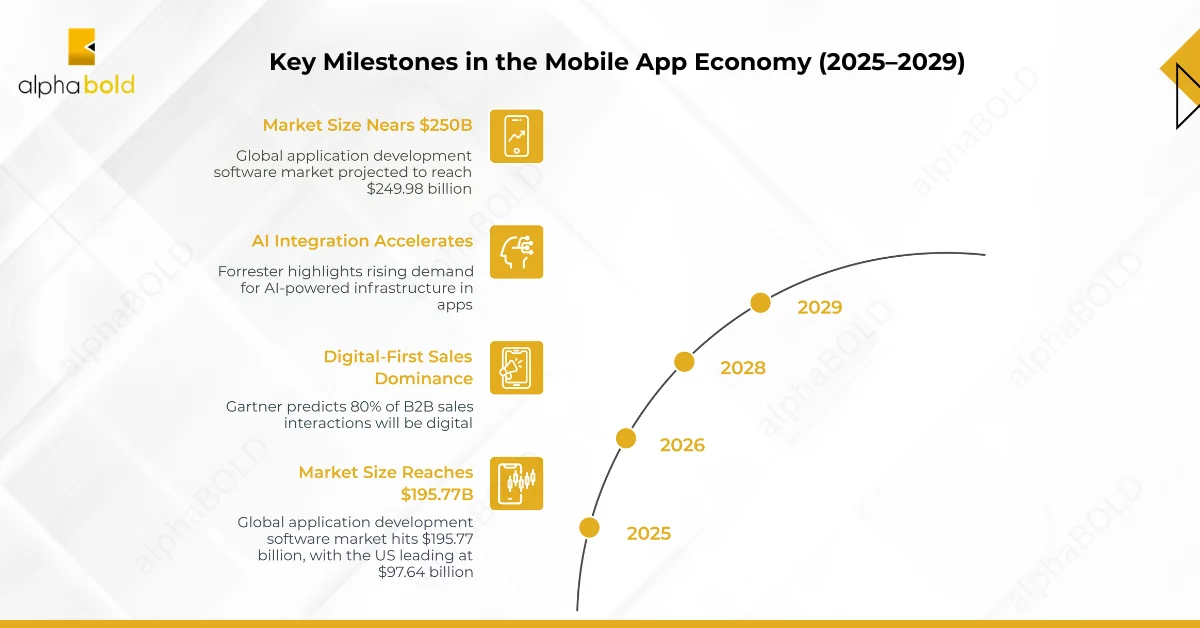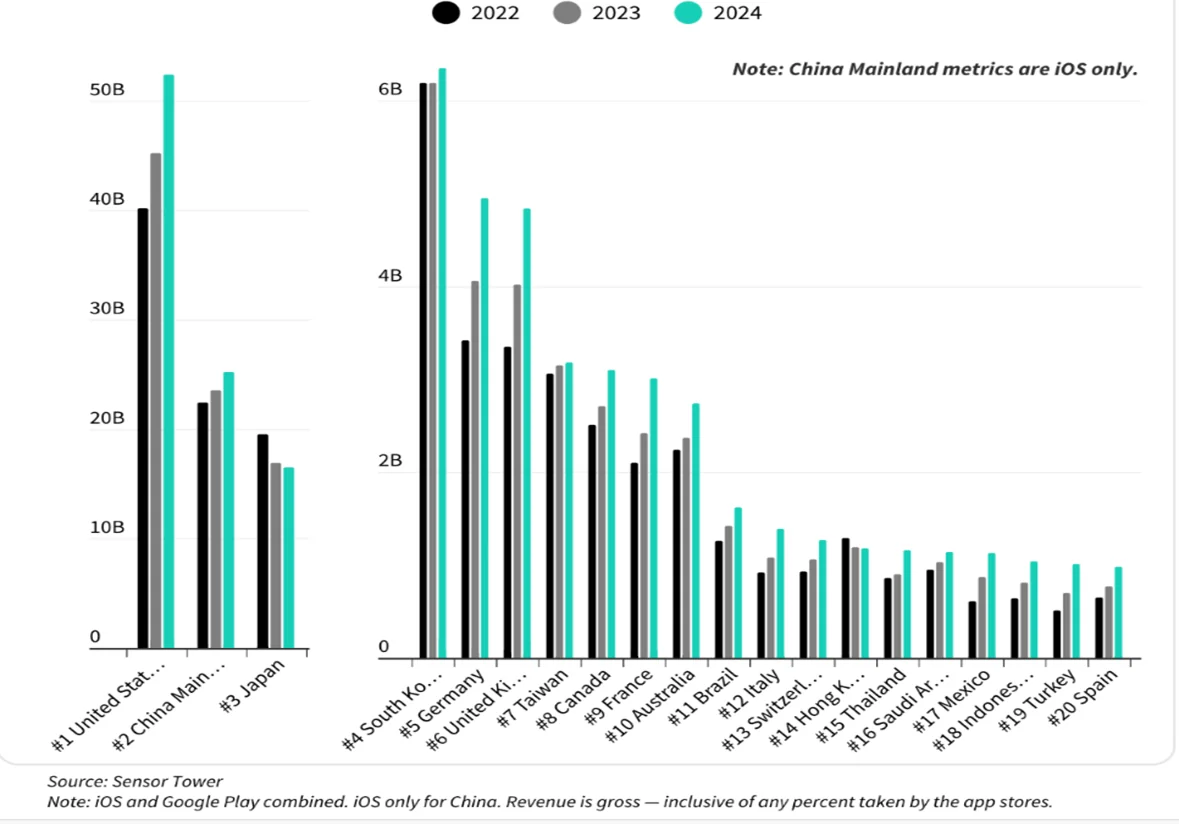Table of Contents
Introduction
Customers today expect seamless, personalized experiences, and mobile apps deliver exactly that. For businesses, investing in a mobile app for business use is no longer about keeping up; it’s about creating new revenue streams, strengthening customer loyalty, and building operational efficiency.
This article explores how a mobile app for your business can drive revenue growth, highlights key trends shaping the mobile economy, and shares strategies successful companies use to thrive in 2025 and beyond.
The Mobile App Economy: A Revenue Opportunity for Businesses
The global demand for application development software—a foundation for mobile app innovation—is rising rapidly. In 2025, the market is projected to generate an impressive US$195.77 billion in revenue worldwide. Over the next four years, the market is expected to grow steadily at a 6.30% annual rate, reaching an estimated US$249.98 billion by 2029.
The United States is predicted to lead this surge, accounting for US$97.64 billion in 2025 alone. Meanwhile, innovation and adoption rates are also accelerating across countries like India and China, further driving the mobile-first economy.

For businesses, this growth presents a clear signal: investing in a mobile app for business is no longer optional — it is a strategic move to tap into one of the fastest-growing digital markets, boost customer engagement, and drive revenue in an increasingly mobile-driven world.

The mobile app economy continues to evolve, offering businesses multiple avenues to generate revenue and enhance customer engagement. Investing in a mobile app for business can unlock these opportunities:
- Digital-First Sales Transformation: Gartner predicts that by 2025, 80% of B2B sales interactions between suppliers and buyers will occur in digital channels. This shift underscores the importance of mobile platforms in facilitating business transactions and customer interactions.
- AI Integration in Apps: Forrester highlights the accelerated demand for AI-powered infrastructure and operations in 2025. Integrating AI into mobile apps can enhance user experiences, personalize content, and streamline operations, thereby driving revenue growth.
- Enhanced Mobile Banking Experiences: Forrester’s research into mobile banking trends indicates a focus on improving mobile app features to meet customer expectations. While specific revenue figures aren’t provided, the emphasis on mobile app enhancements suggests a strategic area for investment.
You may also like: A C-Suite Guide to Building AI-Powered Mobile Apps
Boost Your Business Revenue with a Mobile App
Utilize a mobile app for businesses to boost sales, enhance customer engagement, and foster brand loyalty.
Request a ConsultationCase Studies & Strategies for Revenue Maximization
Businesses across industries are leveraging a mobile app for businesses to drive revenue growth and customer loyalty. A few standout examples include:
- McDonald’s: McDonald’s launched free gaming apps targeted at children to promote its brand, leveraging the freemium model to drive engagement. With 98% of Google Play’s revenue from free apps, McDonald’s capitalized on ad revenue while boosting brand loyalty among younger audiences.
- MyDeal: The e-commerce platform MyDeal introduced a free mobile app that significantly improved buyer attraction and customer retention. The app’s intuitive design and exclusive mobile promotions helped MyDeal strengthen its presence in the competitive online retail market.
- Good Empire: Good Empire uses gamification within its app to encourage users to complete planet-saving tasks. This strategy has helped increase daily active usage and user retention by creating a sense of achievement and community among users.
- Vaiva: Vaiva’s app focuses on building in-app communities around travel documentation, fostering ongoing user engagement and loyalty by offering more than just a functional tool — a connected experience.
Mobile Apps for Businesses: Maximizing Revenue
Businesses looking to boost revenue through a mobile app for business can focus on these proven strategies:
- Freemium Model: Offer core services for free with premium features available for purchase, balancing accessibility with revenue generation.
- In-App Purchases (IAPs): Capitalize on digital products, extra features, or subscriptions, noting that App Store earnings from IAPs outpaced Play Store by a wide margin.
- Gamification and Reward Systems: Integrate challenges, badges, and rewards to increase user engagement and repeat interactions.
- In-app communities: Create spaces where users can connect, share experiences, and deepen their relationship with your brand.
- Social Media Integration: To amplify reach, make sharing achievements, purchases, or app experiences seamless across social platforms.
- Targeted Marketing Campaigns: Execute pre-launch and post-launch marketing tailored to regional app usage patterns and device preferences.
- Platform Strategy by Region: To maximize adoption and monetization, focus development on Android or iOS based on the dominant user base in your key markets.
Investing in a mobile app for business with a strategic approach can significantly enhance revenue growth, improve customer retention, and create long-term business value.
Future Trends and Opportunities
As the mobile economy continues to evolve, several key trends are shaping the future for businesses investing in mobile technology. Companies that align their strategies with these developments will be better positioned to drive long-term revenue growth.
- Continued Expansion of On-Demand Services: On-demand apps are expected to grow as consumers increasingly prioritize convenience, speed, and personalized experiences. Businesses offering services through mobile apps will find new ways to capture and retain customers.
- Rise of AI-Integrated Mobile Applications: AI capabilities such as predictive analytics, personalized content, and intelligent automation are becoming standard in mobile development. Businesses integrating AI into their mobile solutions can deliver smarter, more tailored experiences that drive engagement and sales.
- Increased Focus on Retention and Lifetime Value: With app download rates stabilizing in mature markets, the focus is shifting toward deepening user engagement. Features like gamification, loyalty programs, and community-building within apps are becoming essential for maintaining long-term relationships with customers.
- Regional Growth Opportunities: Emerging markets, particularly in Asia-Pacific and parts of Latin America, continue to see strong mobile adoption rates. Businesses tailoring their mobile strategies to local user behaviors and device preferences will unlock new revenue streams.
- Subscription and Freemium Models Maturing: Subscription-based models are expanding beyond media and entertainment into new industries like health, education, and productivity. At the same time, freemium approaches remain a dominant method for growing user bases and upselling premium features.
For businesses looking to strengthen customer relationships, streamline services, and generate new revenue streams, investing in a mobile app for business use remains a powerful strategy.
You may also like: Mobile App Development: Tech AI, & Investment Guide
Maximize Profits with a Winning Mobile App Strategy
Explore how businesses generate new revenue streams through mobile apps, from freemium models to AI integration.
Request a ConsultationConclusion
In 2025 and beyond, mobile apps will continue to reshape how businesses engage customers, streamline operations, and drive revenue growth. With global investment in mobile technologies rising steadily, a well-planned mobile app for business can offer significant advantages, from opening new sales channels to building lasting customer loyalty.
Businesses that adopt forward-looking strategies like AI integration, on-demand services, and subscription-based models will be better positioned to capitalize on emerging opportunities. Whether enhancing user engagement, optimizing retention, or expanding into new markets, a mobile app built with the right approach can become a critical engine for sustainable growth.
Now is the time to invest in a mobile app strategy that not only meets today’s customer expectations but also scales with tomorrow’s business opportunities.
Explore Recent Blog Posts








